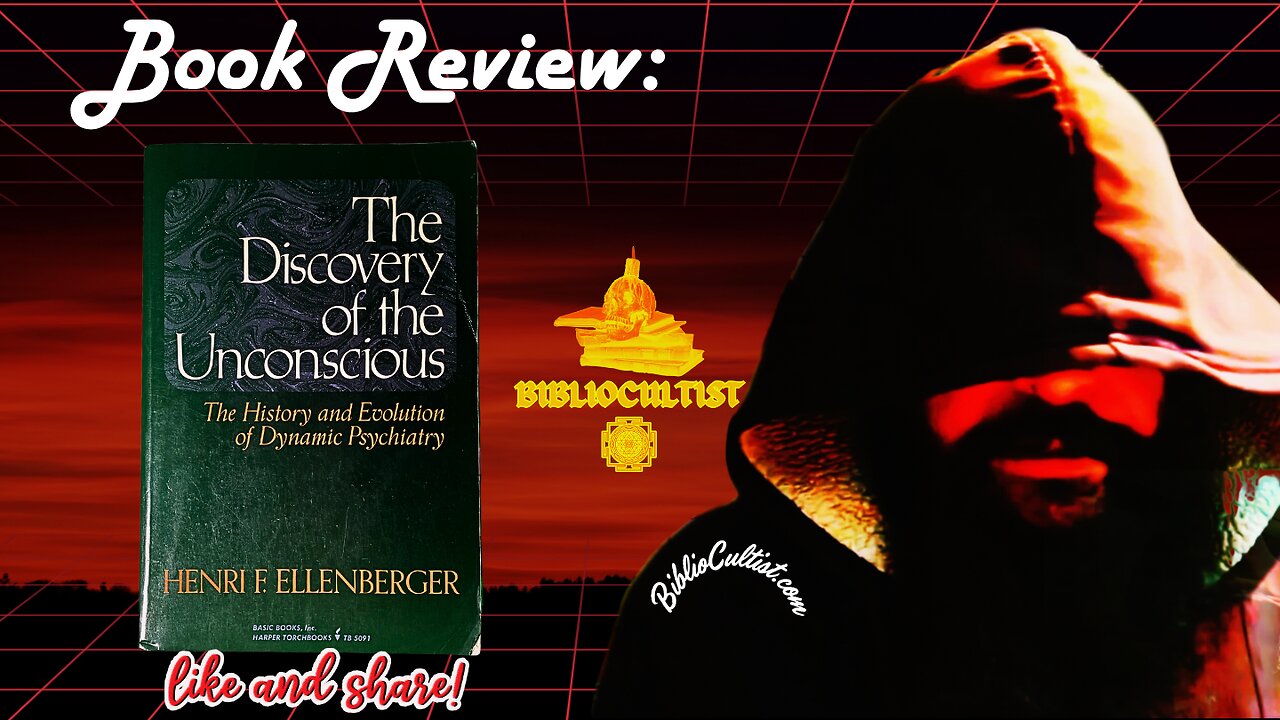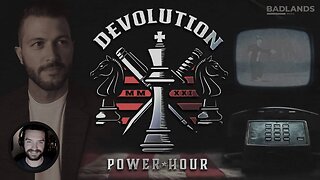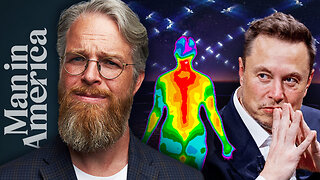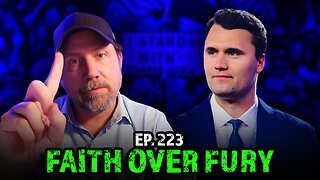Premium Only Content

PSYCHIATRY'S OCCULT ROOTS Exposed
*CHECK OUT MY MERCH: https://bibliocultist.printful.me/*
In this video, I delve into Henry Ellenberger's seminal work 'The Discovery of the Unconscious', a comprehensive exploration of the history and evolution of dynamic psychiatry. This invaluable book traces the foundations of psychiatry from early practices like exorcism and magnetism to the development of hypnotism and 19th-century psychiatric approaches. I discuss how Ellenberger's work provides a thorough primer on the history of psychiatry and the discovery of the unconscious.
*all music and content copyright BiblioCultist.com*
#booktube #books #PsychiatryHistory #Ellenberger #DiscoveryOfTheUnconscious #DynamicPsychiatry #MentalHealth #Exorcism #Hypnotism #PsychiatricApproaches #biblio #cultist
**SHOW NOTES**
1. Henri F. Ellenberger (1905–1993) was a Swiss-born psychiatrist and medical historian, best known for his monumental work The Discovery of the Unconscious (1970). A polyglot and scholar of comparative psychiatry, Ellenberger traced the roots of dynamic psychology from ancient shamanism to Freud, Jung, and beyond, exposing the often-overlooked mystical and philosophical influences on modern psychoanalysis.
2. Exorcism is not exclusively Christian and pre-existed said tradition. Nonetheless, in Western Europe in particular, the term is associated with the Roman Catholic tradition in particular, which evolved into a highly formalized rite, emphasizing juridical authority, structured prayers, and confrontational commands to demons—rooted in Augustinian dualism and medieval Scholasticism.
3. "Animal magnetism," pioneered by Franz Mesmer in the 18th century, was a controversial proto-psychological theory that attributed mental and physical ailments to imbalances in an invisible "magnetic fluid" pervading the body. Mesmer claimed to manipulate this fluid through gestures, magnets, or communal "crises" in tubs of magnetized water—a spectacle blending science and theater.
4. The word "science" derives from the Latin scientia, meaning "knowledge," originally encompassing any systematic study of reality—whether empirical or metaphysical. Ancient and medieval scholars, from Aristotle to Aquinas, treated disciplines like astrology, alchemy, and even demonology as "sciences", since they followed methodical frameworks to explain causes and effects in nature. Only with the Enlightenment did "science" narrow to exclude the transcendent, divorcing scientia from sapientia (wisdom).
5. Jean-Martin Charcot (1825–1893), the pioneering French neurologist, revolutionized the study of hysteria and hypnosis at Paris’s Salpêtrière Hospital, blending clinical rigor with theatrical demonstrations that blurred medicine and performance. His work deeply influenced Freud (who studied under him) and the birth of psychoanalysis.
6. Pierre Janet (1859–1947), was a pivotal figure in early dynamic psychiatry, rivaling Freud yet often overshadowed by him. A student of Charcot, Janet pioneered the study of dissociation and subconscious trauma, coining terms like "subconscious fixed ideas" to explain hysterical symptoms. His rigorous clinical work at Salpêtrière laid foundations for modern psychology, emphasizing psychological automatisms and memory fragmentation—concepts later absorbed (without credit) by Freud.
7. Sigmund Freud (1856–1939), the Austrian neurologist and founder of psychoanalysis, revolutionized psychology with his theories of the unconscious mind, dream interpretation, and infantile sexuality. Pioneering concepts like the Oedipus complex, repression, and the tripartite psyche, he framed human behavior as driven by primal instincts and childhood trauma.
8. Alfred Adler (1870–1937), the Austrian psychiatrist and founder of Individual Psychology, broke from Freud to pioneer a more holistic, socially grounded approach to mental health. Rejecting Freud’s focus on sexual drives, Adler emphasized inferiority complexes, birth order, and the striving for superiority as key motivators of human behavior.
9. Carl Gustav Jung (1875–1961), the Swiss psychiatrist and dissident disciple of Freud, forged analytical psychology, delving into the collective unconscious, archetypes, and the process of individuation. Where Freud saw primal drives, Jung uncovered universal myths and symbols shaping human experience. His concepts of synchronicity and psychological types bridged science and spirituality, influencing fields from anthropology to New Age thought.
10. Scientology, founded by L. Ron Hubbard in the 1950s, is a modern belief system that blends applied psychology, self-help methodologies, and metaphysical cosmology, mirroring earlier movements like psychoanalysis and Jungian depth psychology. Its core practice, auditing, parallels Janet’s focus on dissociation and Freud’s free association, though with a stricter protocol. Hubbard’s esoteric teachings (e.g., thetans, past lives) echo Jung’s archetypes and occult metaphysics.
-
 2:07:44
2:07:44
Inverted World Live
8 hours agoPentagon Says it Solved UFO Cases, Tyler Robinson "Roommate" Missing | Ep. 113
41K15 -
 2:30:00
2:30:00
Badlands Media
14 hours agoDevolution Power Hour Ep. 392: Psyops, Paper Tigers, and the Path to Sovereignty
91.6K17 -
 3:02:08
3:02:08
TimcastIRL
8 hours agoLeftist Terror Attack On ICE In Dallas, Jimmy Kimmel Doubles Down Insulting MAGA | Timcast IRL
349K141 -
 1:17:35
1:17:35
Man in America
13 hours agoIs Starlink RIPPING Us Apart from the Inside Out? w/ Cory Hillis
52.8K18 -
 55:40
55:40
TheSaltyCracker
7 hours agoIdiots Chug Tylenol PT2 ReeEEStream 9-24-25
117K225 -
 5:55:01
5:55:01
Akademiks
8 hours agoYoung Thug Dissing YFN Lucci. Ready to Go back to Jail. Offset vs Cardi b
70.2K4 -
 7:07
7:07
Colion Noir
16 hours agoCalifornia Just Banned All Glocks
61.5K43 -
 1:10:24
1:10:24
Adam Does Movies
9 hours ago $2.81 earnedTalking Movies + Ask Me Anything - LIVE
51.1K1 -
 1:23:56
1:23:56
Jamie Kennedy
7 hours agoChoosing Good in a World Gone Dark | Ep 223 HTBITY with Jamie Kennedy
41.8K6 -
 6:54:11
6:54:11
SpartakusLIVE
11 hours ago#1 Challenge CHAMPION of WZ || Ridin' The GRAVY Train w/ GloryJean
78.5K1